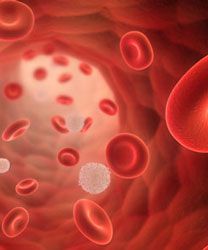Poeschel Discusses Findings for Reduced CHOP Treatment in DLBCL
Viola Poeschel, MD, discusses findings from the phase III FLYER trial and how they will impact the treatment landscape for younger patients with favorable-prognosis DLBCL.<br />

In the phase III, randomized, multicenter FLYER trial, investigators hypothesized that the number of cycles of CHOP chemotherapy given to patients with diffuse large B-cell lymphoma (DLBCL) could be reduced without compromising outcomes.
Overall, 592 patients aged 18 to 60 were randomized to either the standard treatment of 6 cycles of R-CHOP or 4 cycles of CHOP plus 2 cycles of rituximab across 138 centers in Europe. Of these patients, 588 were used in the final analysis.
Patients in both arms received frontline R-CHOP (cyclophosphamide, doxorubicin, vincristine, and prednisone plus rituximab) on days 1, 22, 43, and 64. Patients in the longer duration arm received 2 additional cycles of R-CHOP on days 85 and 106. Those in the shorter duration arm received rituximab on days 85 and 106.
At a median follow-up of 66 months, the 3-year progression-free survival (PFS) rate was 94% (95% CI, 91-97) for patients who received 6 cycles of frontline R-CHOP (n = 295) compared with 96% (95% CI, 94-99) in those who received 4 cycles of frontline R-CHOP followed by 2 cycles of rituximab (n = 293). The 3-year overall survival (OS) rates at a median follow-up of 67 months were 98% (95% CI, 96-99) versus 99% (95% CI, 98-100), respectively.
In an interview withTargeted Oncology, Viola Poeschel, MD, department of hematology, oncology, and rheumatology, Saarland University Medical School, Germany, discussed these findings and how they will impact the treatment landscape for younger patients with favorable-prognosis DLBCL.
TARGETED ONCOLOGY:Can you provide us with some background on how the FLYER trial came about?
Poeschel:The scientific background for the study came out of the MInT trial, where we saw that this patient population with an excellent prognosis, those patients present with aaIPI of 0 in the absence of bulky disease. Their 3-year progression-free survival [PFS] in the MInT trial was 95%. Therefore, it was our aim to investigate whether we could maintain efficacy and reduce toxicity by reduction of CHOP.
The FLYER trial started in December 2005, and we recruited until October 2016. We recruited patients in 138 centers from Germany, Italy, Israel, Denmark, and Norway. In total, we included 592 patients, and we had 588 patients for final analysis.
TARGETED ONCOLOGY:How was this trial designed?
Poeschel:First of all, we included patients for first-line therapy with aggressive B-cell lymphoma who were up to 60 years of age (age 18-60), had limited stage disease, aaIPI of 0, and no bulky disease, meaning their maximum tumor diameter was less than 7.5 cm. Patients were randomized to receive either 6 cycles of R-CHOP-21 (21-day cycle of R-CHOP) or 4 cycles of CHOP-21 plus 2 cycles of rituximab.
TARGETED ONCOLOGY:What were the findings?
Poeschel:Our primary endpoint was 3-year PFS, and the design was a noninferiority design. We found that 3-year PFS after 6 cycles of R-CHOP was 94%, and we found that the 3-year PFS after 4 cycles of R-CHOP was 96%. It is definitely noninferior to the standard arm, and also, event-free survival was equal, while overall survival had no differences between the 2 arms. Those were the results regarding efficacy.
We saw that we could reduce toxicity. Six cycles of R-CHOP led to a higher toxicity with respect to hematologic toxicity, like cytopenia of all grades, anemia of all grades, and the difference was about one-third. We also found that the total number of nonhematologic adverse events [was] reduced if we only gave 4 cycles of R-CHOP. We also found that the relapse rates were similar in both arms. We had, in total, 24 relapses: 13 in the standard arm and 11 in the experimental arm.
To sum it up, efficacy after 4 cycles of CHOP plus 2 cycles of rituximab is definitely noninferior to the previous standard of 6 cycles R-CHOP, so it is safe to give to patients. It is less toxic, and the relapse patterns are similar.
TARGETED ONCOLOGY:Do you think the cycles of R-CHOP can be reduced further?
Poeschel:In my personal opinion, you need a certain amount of R-CHOP to eradicate the malignant clone. I don’t know whether you can go less than this because you don’t want to expose patients to a higher risk of relapse.
Examining the Non-Hodgkin Lymphoma Treatment Paradigm
July 15th 2022In season 3, episode 6 of Targeted Talks, Yazan Samhouri, MD, discusses the exciting new agents for the treatment of non-Hodgkin lymphoma, the clinical trials that support their use, and hopes for the future of treatment.
Listen